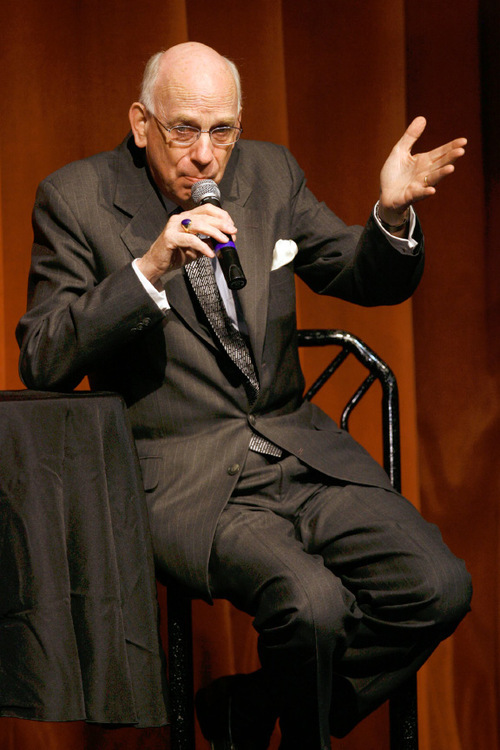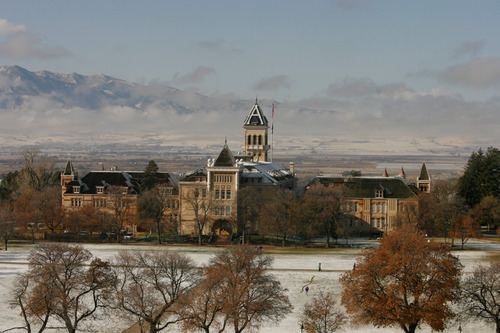This is an archived article that was published on sltrib.com in 2010, and information in the article may be outdated. It is provided only for personal research purposes and may not be reprinted.
Washington • With unrivaled aggression, Utah State University has sought congressional funding to study everything from cyber attacks in the business world to clashes between humans and animals.
USU regularly requests more earmarks than the rest of the state's public and private colleges combined. And Sen. Bob Bennett, a senior member of the appropriations committee, has consistently delivered, snagging $25 million in the past year largely to fund agriculture, energy, education and space-related research.
But with Bennett's ouster — effective in January — the university faces a future in which those once reliable earmarks are about to become much harder to get.
"It's not going to be the same as it has been because we don't have an appropriator anymore," said Michael Kennedy, USU's vice president for government relations.
Estimating that federal spending throughout the state will dip considerably for years to come, Kennedy said, "We are starting to adjust strategies and manage the expectations going forward."
The contenders for Bennett's seat, Republican candidate Mike Lee and his Democratic opponent Sam Granato, have met with USU leaders in Logan and each speaks highly of the campus. But they have different views when it comes to federal spending, particularly on earmarks, which are items supported by an individual member of Congress to benefit an organization in their home state.
Lee, the frontrunner, has promised to forgo all earmarks for his first year in office and take a minimalist approach from then on. He said generally he believes education is something the state should handle, though he promised not to stand in the way of research funding with an obvious federal tie.
"Even if it's a program I might not vote for, I can make sure the process is handled fairly and Utah gets its fair share," Lee said.
Granato promised he would fight for every dollar he could get for USU and other colleges.
"I will be promoting Utah State as vigorously as I can and walking in the footsteps of Senator Bennett as much as I can," he said. "What I lack in seniority, I will make up in enthusiasm and business sense."
Like Bennett, Granato touts earmarks as seed money, which the university can use to attract private donations or money from the Legislature.
No matter who wins the Nov. 2 election, he is unlikely to get Bennett's spot on the appropriations committee, which sifts through earmark requests to determine what gets funded and what doesn't.
"It's always a little nicer to have an inside man," Bennett said.
USU will rely on Sen. Orrin Hatch and Rep. Rob Bishop to back their projects going forward, but Congress tends to favor requests supported by a state's entire delegation.
"If my successor decides he's not going to sign on to any requests, that will make it that much harder ... to get the appropriations committee to pay attention to it," Bennett said. "I would hope my successor would continue to recognize what a great asset Utah State is."
USU receives about $180 million in federal funds annually and somewhere between 10 percent and 20 percent of that routinely comes from earmarks Bennett has secured.
This year, Utah State requested money for 32 projects.
The University of Utah came in second among the state's 11 public and private colleges, with nine earmark requests.
None of the state's for-profit colleges asked Bennett for earmarks.
Bennett and Kennedy say USU's heavy reliance on federal earmarks stems mostly from how it was created and what it focuses on.
The University of Utah is the state's biggest research school, but most of its federal funding comes in the form of medical grants that are not handed out through the earmarking process.
USU is Utah's official land-grant college, a federal designation that gives it access to a number of agriculture and energy-related accounts, most of which are subject to congressional earmarks.
Aside from Bennett's membership on the full appropriations committee, it didn't hurt Utah State's earmark prospects that he also was the top Republican on the agriculture subcommittee before switching to the energy subcommittee.
"What they were doing fit pretty well with what I was doing," Bennett said.
But then Bennett had to face Utah's Republican delegates, many of whom were upset with federal spending and viewed earmarks as wasteful.
He never made it out of the May convention, meaning his 18-year Senate career is coming to an end.
As a consequence, Kennedy said USU will be a little more circumspect when asking for earmarks. Some researchers will feel the squeeze, some projects may get truncated, some student jobs are likely to be lost.
"We will miss it and we will try to get as much of it as we can," Kennedy said. "But this isn't the end of USU research, we will continue to thrive."
The last time USU felt this pain was in 1993, when Bennett replaced Sen. Jake Garn, who happened to oversee the Senate appropriations subcommittee that handled requests for space research.
At that time, Garn, was Utah State's champion, funneling millions to its projects. When he retired, USU showed its gratitude by naming a research building at the Space Dynamics Lab after him.
The year the school dedicated the Garn building is the year Bennett gained a spot on the appropriations committee.
It seems a safe bet that Bennett's name will, before long, be memorialized on campus.
"I anticipate down the road something will be named after Senator Bennett," Kennedy said. "That would be appropriate for what he has done for USU as a champion for our school and our research."
Earmark requests
There's a wide gap between Utah State's requests for congressional funds and those of Utah's other colleges and universities. Here are the earmark requests for fiscal 2011.
32 • Utah State
9 • University of Utah
5 • Weber State
3 • Utah Valley University, Westminster College
2 • Snow College, Salt Lake Community College
1 • Dixie State
0 • Brigham Young, College of Eastern Utah —
Bennett delivered
The amount of money Bennett helped USU receive through the earmarking process by fiscal year.
2010 • $25.8 million
2009 • $16.8 million
2008 • $17 million
2007 • $6.7 million
2006 • $7.3 million
Source: Utah State, Taxpayers for Common Sense





